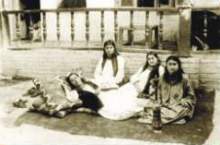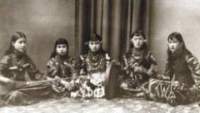 Local beauties to fill Allah Kuli Khan's Tosh Hauli Harem |
Allah Kuli Khan (whose name means 'slave of God') was blissfully unaware
of the plans being put into place in Russia for a massive invasion. He
inherited a well-endowed treasury from his father. The Khanates' traditional
sparring partners, Bukhara and the Turkoman tribes, were largely still
licking their wounds after the victories of Mohammed Rakhim Khan. However,
this situation was not to last long. The feeble Emir of Bukhara died and
was replaced by his energetic son, who was keen to avenge the Emirate
and managed to rout Allah Kuli Khan in battle. Nor was this the Khan's
only concern.
Trade with Russia had declined considerably. Relations were frosty as
the Russians grew ever more incensed at the growing number of their citizens
captured and sold in Khiva as slaves. The uneasy Khan hastily penned a
letter to the 'Ingliz' hoping fervently for help. Captain Abbott was despatched
and attempted to explain to the Khan that his only hope of success was
to relinquish all Russian slaves held in the Khanate. The stiff-upper-lipped
Brit was on the verge of convincing the Khan when news arrived that the
huge Russian army had turned back in the desert, having suffered a terrible
winter.
 Taken from Local beauties to fill Allah Kuli Khan's Tosh Hauli Harem 'Khiva Caught in Time' |
Meanwhile, fearing Captain Abbott dead, the British station at Herat had despatched another officer. Richard Shakespear arrived in Khiva a few months later and his flamboyant and charismatic character made a much more positive impression on the Khan. The feelings were mutual, and Shakespear described the Khan as,
'A good natured, unaffected person of about forty five years of age, he has invariably treated me with much kindness, and appears very anxious to gain information regarding England and Europe generally.'
Richmond Shakespear 'A Personal Narrative of a Journey from Herat to Orenburg, on the Caspian, in 1840' 1842
Eventually he succeeded in persuading Allah Kuli to release all the Russian
slaves held and trade relations with Russia were resumed.
Delivered from disaster, the Khan set about building the magnificent Allah
Kuli Madrassah in gratitude to the Almighty. This was just one of many
buildings he commissioned. He had ambitious plans to transform the eastern
side of the city, and built the Tosh Hauli Palace, the Tim and Caravanserai,
as well as redecorating the Kunya Ark and restoring the Said Allaudin
Mausoleum and the Okh Mosque. Renowned for his impatience, he impaled
the palace architect who had timidly suggested that the Tosh Hauli would
take longer to build than Allah Kuli Khan's prescribed two years.
The Khan was keen to see Khiva's history recorded for posterity, particularly
his own reign, and commissioned the historian Munis to write an account
of the Khanate's past. Also a patron of the arts, the Khan keenly supported
the musician Komil Khorezmi who invented a process of musical note annotation.
Midway through a siege (always a popular pastime for any Khan), Allah
Kuli became sick and was taken back to the Ichan Kala where he died and
was buried in the Pakhlavan Mahmoud Mausoleum.